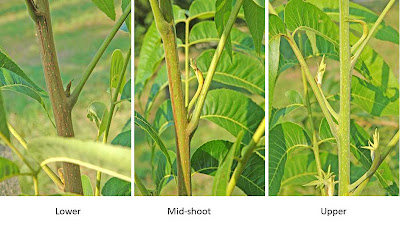A bark graft placed on a large tree can grow very fast. Today, I returned to the tree I had topworked this past April for some additional directive pruning. Just 4 weeks ago, I pruned this graft to a single central leader and now the new leader has grown to nearly 5 feet tall (photo at right).
The graft has also grown in girth. The photo at left gives you some idea of how much this graft has grown. The original scionwood I placed for this graft was about 3/8 of an inch in diameter. Now that scion is almost 1 inch in diameter and still growing.
Note the size of the central leader compared to the size of the lateral branch I pruned off the last time I visited this tree. Four weeks ago all the shoots growing from the scionwood stick were roughly the same diameter. Now, with all the tree's energy focused on just one shoot, my central leader is becoming well defined.
To maintain the growth of a strong central leader, I spent some time to remove stalked buds and practice the two foot rule for pecan tree training. Looking over the central leader of this new graft, I noticed that stalked buds became more prevalent and further extended as I looked up the stem (photos above). Left alone, these stalked buds would have grown into branches, giving the tree a overly-heavy, bushy top that is more prone to wind breakage.
Caught early in their development, stalked buds are easy to remove. I just break them off with my fingers (photo at right). I took me just a few seconds to clear the entire central leader of stalked buds. Those few seconds were a great investment, saving me from having to spending hours trying to prune out the weakly attached lateral branches with bark inclusions that would have developed from the stalked buds.
The final step in today's tree training operation was to place an additional tie to attach the central leader near the top the 2 x 2 inch post (photo at left). I may have needed a step ladder but I sure don't want to loose such a strongly growing graft to the winds of a summer thunderstorm




